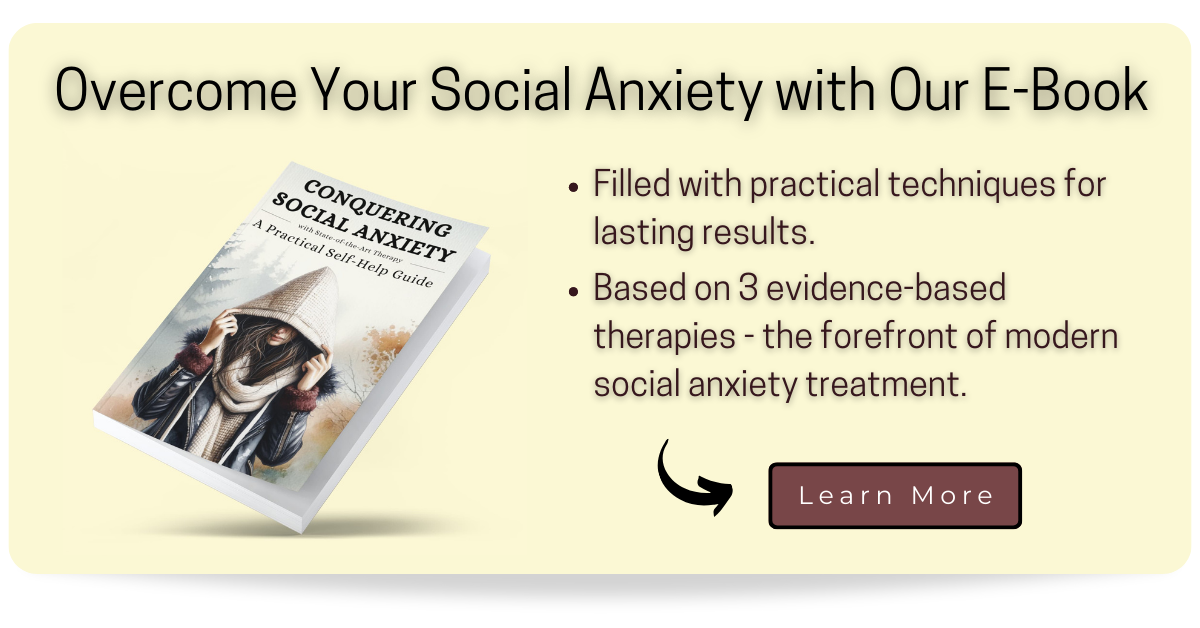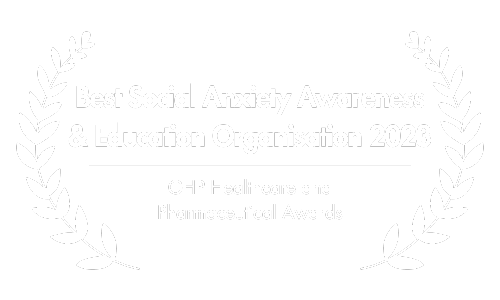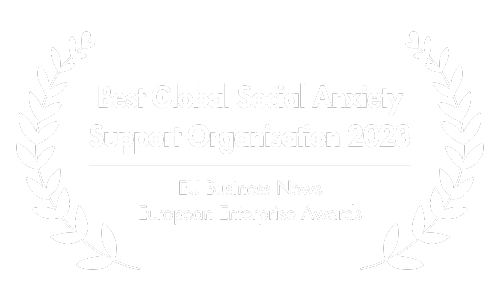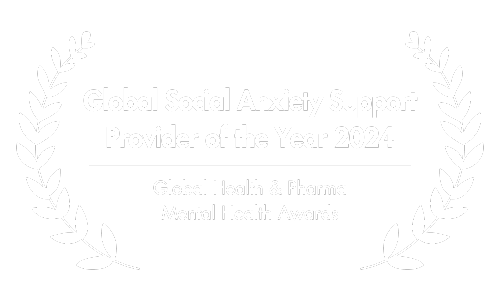ACT Now: Beat Social Anxiety with Acceptance & Commitment Therapy
This article includes recommendations for products & services that help with social anxiety. By using our links, you may receive a significant discount and we will earn a commission.
Social anxiety, a pervasive and often distressing condition, casts a shadow on the lives of countless individuals.
It refers to the unease that accompanies entering a room filled with strangers, the racing heart and clammy hands that arise when speaking in public, or the general fear of being judged in daily social interactions.

These experiences are familiar to those who grapple with social anxiety – a persistent fear of being scrutinized, embarrassed, or humiliated in social situations (American Psychiatric Association, 2013).
As we acknowledge the significance of addressing this challenge, the quest for effective therapies becomes paramount.
In this pursuit, one approach shines brightly: Acceptance and Commitment Therapy, or ACT.

We understand that confronting social anxiety can be a daunting journey, and that’s precisely why we’re here.
In this article, we’ll explore how acceptance and commitment therapy can help you overcome social anxiety and empower you to make informed decisions about your therapeutic path.

A. Understanding Social Anxiety
To effectively explore ACT, it’s crucial to grasp the essence of social anxiety.
Social anxiety goes beyond momentary unease; it’s a profound fear that can infiltrate personal, academic, and professional domains.
At its core, social anxiety is an intense dread of social situations, fueled by the fear of judgment, criticism, or rejection.
Those wrestling with social anxiety often battle self-doubt, self-consciousness, and the sensation of constant scrutiny.

The causes of social anxiety are complex and are shaped by genetic predisposition, past experiences, and societal influences.
Importantly, social anxiety is a widespread experience that affects people of all ages and backgrounds (Kessler et al., 2005).
A defining trait of social anxiety is the tendency to evade anxiety-inducing situations. While avoidance offers temporary relief, it perpetuates anxiety by preventing the necessary confrontation of fears.
In the following sections, we’ll be guiding you through ACT’s essence, its scientific roots, advantages, and practical use in addressing social anxiety’s challenges.

B. What is Acceptance and Commitment Therapy
Among the several therapeutic options for social anxiety, ACT has emerged as a powerful contender throughout the last two decades.
Rooted in mindfulness, acceptance, and behavioral change strategies, ACT offers a distinct approach that resonates with individuals seeking a transformative path.
At its core, ACT is not about eradicating difficult emotions or thoughts; rather, it centers on embracing them.
The aim is to build psychological flexibility – the capacity to adapt to life’s challenges with resilience and open-heartedness.

In this respect, ACT stands apart from traditional talk therapies by emphasizing actionable steps toward a more fulfilled and meaningful life.
ACT is built upon six core processes, each contributing to the therapy’s comprehensive approach:
(1) Cognitive Defusion
Cognitive defusion, a cornerstone of ACT, involves learning a valuable skill: observing your thoughts without being under their control.
By creating a distance from anxious thoughts, you gain the power to shift your relationship with them.
This process doesn’t seek to eliminate anxious thoughts; instead, it empowers you to recognize them as passing mental events rather than ultimate truths.
This newfound perspective diminishes their hold over your emotions and behaviors, enabling you to approach them with a greater sense of clarity and choice.

(2) Acceptance
As you’ve likely experienced, attempting to suppress, combat, or alter uncomfortable anxiety sensations often has the unintended consequence of intensifying them.
Acceptance is the gentle art of welcoming all emotions, including anxiety, without judgment or attempts to suppress them.
In ACT, you’re encouraged to cultivate a compassionate attitude toward yourself, recognizing that experiencing anxiety is a normal part of being human.
By allowing emotions to flow without resistance, you prevent the escalation of inner conflict and emotional turmoil.
This process frees up mental resources that can be redirected towards understanding and managing anxiety in a healthier way.

(3) Present Moment Awareness
Anxiety often thrives on anticipation and rumination about the future.
Present moment awareness, a practice rooted in mindfulness, helps shift your focus away from dwelling on worries and toward engaging fully in the experiences of the here and now.
By grounding yourself in the present moment, you lessen the hold that anxious thoughts have on your attention.
This process promotes a heightened sense of clarity, enabling you to experience life more fully and with greater equilibrium.

(4) Self-as-Context
In the world of social anxiety, it’s easy to become consumed by anxious thoughts and feelings, blurring the lines of your identity.
Self-as-context is the process that helps you recognize that your sense of self extends far beyond anxiety.
You’re encouraged to see yourself as the observer of your thoughts and emotions, not solely defined by them.
This shift in perspective creates a mental space that fosters resilience, as you can disentangle your core identity from the fluctuations of anxiety.

(5) Values Clarification
Values clarification involves exploring your core principles and what truly matters to you.
By identifying your personal values, you gain a compass that guides your life’s direction. This process illuminates the path to meaningful engagement with life, acting as a beacon of purpose.
In the context of social anxiety, recognizing your values can empower you to confront anxiety-provoking situations for the sake of what truly matters, even when fear is present.

(6) Committed Action
At the heart of ACT is the concept that taking action aligned with your values is a potent antidote to anxiety.
Committed action involves stepping beyond the bounds of avoidance and engaging in purpose-driven actions that resonate with your values.
In the realm of social anxiety, this might mean participating in social situations that you once avoided.
The presence of anxiety no longer dictates your actions; instead, your actions are guided by what is meaningful and purposeful to you, fostering personal growth and a sense of empowerment.

Understanding and applying these six core processes of ACT can equip you with valuable tools to navigate the challenges of social anxiety with resilience and purpose.
Each process interweaves with the others, creating a holistic framework that empowers you to transform your relationship with anxiety and lead a more fulfilling life.
C. Science Behind ACT for Social Anxiety
While the concept of ACT might sound intriguing, you might be wondering whether it’s grounded in scientific research.
Rest assured, the effectiveness of ACT in addressing social anxiety is supported by a growing body of empirical evidence.

Numerous studies have demonstrated the positive impact of ACT on reducing social anxiety symptoms and enhancing psychological well-being. Here is a glimpse of the research findings:
- Rigorous studies suggest that ACT holds promise as a viable alternative to established cognitive behavioral treatments for anxiety disorders, including social anxiety disorder, offering an evidence-based therapeutic option (Landy et al., 2015).
- ACT has been shown to effectively reduce symptoms of social anxiety disorder, enhancing psychological flexibility and self-compassion while addressing external shame and emotion regulation difficulties (Khoramnia et al., 2020).
- Research underscores ACT’s effectiveness in reducing anxiety, depression, and social anxiety in students with social phobia, underscoring its potential as an impactful psychological intervention (Molavi et al., 2014).
- Internet-delivered ACT demonstrates efficacy in reducing general and social anxiety symptoms (Ivanova et al., 2016).
- A self-help approach based on mindfulness and acceptance has been found effective in reducing social anxiety, showcasing positive changes in related factors (Kocovski et al., 2019).

D. Benefits of ACT for Social Anxiety
ACT offers a holistic and empowering approach to addressing social anxiety. Beyond symptom reduction, ACT provides practical tools and skills that pave the way to a more meaningful and fulfilling life.
One of the fundamental benefits of ACT lies in its emphasis on acceptance. Rather than struggling against or suppressing anxious thoughts and emotions, individuals learn to acknowledge and accept them.
This way, ACT directly addresses a common hurdle known as experiential avoidance – the tendency to evade or avoid uncomfortable emotions and situations at all costs -, which is highly prevalent among people with social anxiety and often perpetuates social anxiety symptoms (e.g., Dalrymple & Herbert, 2007; Kashdan et al., 2010).

By embracing the present moment through mindfulness practices, individuals develop a greater awareness of their thoughts and feelings.
This heightened awareness fosters a sense of clarity and distance, enabling them to respond more skillfully to challenging situations.
The result is a reduction in reactive behaviors and an increased ability to choose responses aligned with personal values.
Values clarification, another core aspect of ACT, empowers individuals to define what truly matters to them.
This process ignites a sense of purpose and direction, acting as a motivational force to engage in actions that might otherwise be avoided due to anxiety.

Through gradual exposure to anxiety-inducing situations, individuals build resilience and confidence, breaking free from the grip of avoidance behaviors.
Additionally, ACT’s principles can have a ripple effect beyond social anxiety.
The skills learned in therapy are transferrable to other areas of life, enhancing overall well-being and psychological flexibility.
Individuals often report improvements in relationships, academic or professional pursuits, and a greater ability to navigate life’s challenges with equanimity.
E. The ACT Process Applied to Social Anxiety
ACT presents a structured yet dynamic process that proves to be a powerful ally in managing social anxiety.

By revisiting the core elements of the ACT process in the context of social anxiety, you gain a deeper understanding of how these principles can be harnessed to reshape your relationship with anxiety and foster psychological flexibility.
- Cognitive Defusion: Shifting Perspectives on Anxious Thoughts
- Recognize that anxious thoughts are not incontrovertible truths but mental events.
- Detach from the grip of anxious thoughts by observing them without entanglement.
- Reframe the way you interact with anxious thoughts by acknowledging their impermanence and subjective nature.
- Acceptance and Present Moment Awareness: Embracing the Here and Now
- Embrace the practice of mindfulness to be fully present in social situations.
- Accept the full spectrum of emotions, including anxiety, without judgment or avoidance.
- Cultivate a non-striving attitude toward present experiences, allowing you to respond more effectively to anxiety triggers.
- Self-as-Context and Values Clarification: Defining Personal Significance
- Shift from being immersed in your anxious thoughts to observing them from a broader perspective.
- Uncover personal values that guide your actions and decisions.
- Clarify what truly matters to you in social interactions, grounding you in purposeful intentions.
- Committed Action: Navigating Social Anxiety with Purpose
- Transcend avoidance behaviors by committing to meaningful actions aligned with personal values.
- Engage in gradual exposure to anxiety-inducing situations while focusing on values-driven actions.
- Develop resilience by navigating social challenges, allowing anxiety to coexist with purposeful behaviors.

F. Working with a Therapist
Embarking on the journey of ACT for social anxiety typically involves partnering with a skilled therapist who guides and supports you through the process.
A therapist serves as a compass, helping you navigate the intricacies of social anxiety while tailoring ACT techniques to your unique needs.
The therapeutic relationship is a collaborative one, built on trust, empathy, and open communication.
Your therapist will create a safe space where you can explore your thoughts, emotions, and experiences related to social anxiety.

They will listen attentively, ask thought-provoking questions, and offer insights that illuminate your path toward growth.
One of the therapist’s roles is to introduce you to the foundational principles of ACT. They will guide you through exercises that promote cognitive defusion, acceptance, mindfulness, and values clarification.
Together, you’ll explore how these concepts can be applied to your specific social anxiety challenges.
As you progress, your therapist will help you set achievable goals and design action plans that align with your values.
This may involve gradually confronting anxiety-provoking situations through exposure exercises while maintaining focus on values-driven actions. Your therapist’s expertise ensures that these steps are tailored to your pace and comfort level.

Additionally, therapy provides a platform for reflection and feedback. You’ll have the opportunity to discuss your progress, setbacks, and insights gained from applying ACT techniques.
The therapist’s guidance and encouragement will empower you to persevere, even in the face of challenges.
Remember, seeking therapy is a courageous step toward self-improvement. The therapist’s support, combined with your commitment and determination, forms a partnership that can lead to transformative change.
Further below, we have two recommendations for online therapy providers that offer ACT.
G. Is ACT Right for You?
As you consider the path of ACT for managing social anxiety, you might be wondering whether this approach aligns with your needs and preferences.
While only you can make this decision, we can provide some insights to help you determine if ACT might be a suitable fit.

Indicators that ACT Might Benefit You
- You Seek a Holistic Approach: If you’re drawn to therapies that integrate mindfulness, acceptance, and values-based action, ACT could resonate with your desire for a comprehensive approach.
- You Want to Cultivate Psychological Flexibility: If you’re interested in developing the ability to respond adaptively to anxiety-inducing situations while staying true to your values, ACT offers a skillset for enhancing psychological flexibility.
- You’re Open to Mindfulness Practices: ACT places a strong emphasis on mindfulness techniques. If you’re open to cultivating present-moment awareness and observing your thoughts and emotions, ACT may align with your preferences.
- You’re Willing to Engage in Exposure Exercises: Exposure is a key component of ACT, involving gradual engagement with anxiety triggers. If you’re open to facing your fears through controlled exposure, ACT provides a framework for doing so.

Consultation with a Mental Health Professional
While these indicators can help you assess ACT’s potential alignment with your goals, it’s important to consult with a qualified mental health professional.
A therapist can conduct an assessment to determine if ACT is a suitable fit based on your unique circumstances, preferences, and challenges.
Remember that therapy is a collaborative journey, and finding the right fit is essential.
If you decide that ACT aligns with your goals, working with a therapist trained in this approach can provide you with tailored guidance, support, and techniques to navigate the challenges of social anxiety.

H. Recommendations: Workbook, App, & Online Therapy
In your journey toward managing social anxiety with ACT, we recognize the importance of having the right resources at your disposal.
Whether you’re seeking practical exercises, guided meditation, or online therapy, here are some recommendations that can complement your efforts and enhance your progress:
Book Recommendation: The Mindfulness and Acceptance Workbook for Social Anxiety and Shyness
For those seeking effective strategies to tackle social anxiety through the lens of ACT, we recommend diving into ‘The Mindfulness and Acceptance Workbook for Social Anxiety and Shyness‘ (available for purchase here).
Crafted by renowned experts in the field, this workbook combines psychological insights with practical exercises, providing you with a structured pathway toward conquering shyness and social anxiety.

This resource is more than just a workbook; it’s a guide to transforming your relationship with social anxiety.
The evidence-based approach and proven effectiveness make this workbook an essential tool on your journey toward greater social confidence and well-being.
App: Headspace
To immerse yourself in mindfulness and meditation practices, we wholeheartedly recommend the Headspace app.
With its user-friendly interface and expert-guided meditations, Headspace provides a seamless platform for cultivating mindfulness and self-compassion, which are pivotal in navigating social anxiety.
Research has shed light on the benefits of using Headspace. Studies indicate significant improvements in irritability, affect, and stress due to external pressures (Economides et al., 2018).

Moreover, participants experienced a reduction in anxiety and worry after just four weeks of using the Headspace app (Abbott et al., 2023).
Moreover, a systematic review assessing the efficacy of mindfulness apps, including Headspace, with consideration for conflicts of interest, concluded that the results of trials investigating Headspace are promising (O’Daffer et al., 2022).
You can embark on your mindfulness journey by downloading the app by clicking below. You will be able to access a free 7-14 day trial period to see if you like it.
If you are a student, you should click below instead. This will allow you to access a special student discount, tailored to your situation and help you manage social anxiety effectively. You will still be able to access the free trial period this way.

BetterHelp for Online ACT
If you’re seeking online therapy for managing your social anxiety, “BetterHelp” is an invaluable platform to explore. With a diverse range of therapeutic modalities, including ACT, BetterHelp provides personalized support tailored to your unique needs.
With BetterHelp, you pay monthly, get one live session per week and unlimited chat contact with your therapist – and you can get started in no time.
Click the link below to get started, and you’ll be prompted to provide insights into your current situation and therapist preferences. This step enables you to tailor the selection process to match your specific therapy needs, allowing you to choose acceptance and commitment therapy as your preferred choice.

Talkspace for Online ACT
For those desiring a comprehensive array of therapeutic approaches to address social anxiety, “Talkspace” offers a versatile platform catering to various needs. With an array of therapeutic specialties, including ACT, Talkspace presents a diverse selection of experienced therapists.
What sets Talkspace apart is its integrated psychiatry service, providing an avenue for individuals contemplating the integration of medication into their therapeutic journey. However, this service is optional.
By the way, you can click here to read our full guide on pharmacological treatment for social anxiety.
With Talkspace, you pay monthly, get one live session per week and unlimited chat contact with your therapist – and you’re up and running in no time.
Discover the possibilities offered by Talkspace through the link provided below. Our link grants you access to a special $80 discount code.

I .Conclusion:
In the exploration of addressing social anxiety, ACT offers a transformative path illuminated by mindfulness, acceptance, and purposeful action.
These qualities enable individuals to navigate the challenges of social anxiety with newfound resilience.
By embracing the present moment, cultivating psychological flexibility, and aligning actions with personal values, individuals can transform their relationship with social anxiety.
The journey is not about eradicating anxiety but about coexisting with it while pursuing a life rich with meaning and connection.
Acceptance and commitment therapy is an invitation to embark on a transformative journey – a journey that holds the promise of greater self-awareness, enhanced well-being, and the liberation to thrive in social interactions.

As you consider your next steps, remember that seeking support is a courageous act.
Whether you choose ACT or another therapeutic approach, your commitment to growth and well-being is a testament to your strength.
We encourage you to explore further, engage with mental health professionals, and make informed decisions that align with your unique needs. May this article serve as a guiding light on your path toward managing social anxiety.
If you’re eager to embark on a journey of exploration through diverse therapeutic avenues to address social anxiety, we invite you to discover our comprehensive therapy guide by clicking right here.
Furthermore, if you’re seeking a comprehensive overview that spans therapy, medication, and self-help approaches, you’re welcome to dive into our in-depth guide available here.
Still have lingering questions? Take a step toward clarity and empowerment by enrolling in our Free 7-day Email Course. We’re dedicated to being your guide on this journey of understanding and growth.

American Psychiatric Association. (2013). Diagnostic and statistical manual of mental disorders (5th ed.). Author.
Dalrymple, K. L., & Herbert, J. D. (2007). Acceptance and commitment therapy for generalized social anxiety disorder: a pilot study. Behavior modification, 31(5), 543–568. https://doi.org/10.1177/0145445507302037
Ivanova, E., Lindner, P., Ly, K. H., Dahlin, M., Vernmark, K., Andersson, G., & Carlbring, P. (2016). Guided and unguided Acceptance and Commitment Therapy for social anxiety disorder and/or panic disorder provided via the Internet and a smartphone application: A randomized controlled trial. Journal of anxiety disorders, 44, 27–35. https://doi.org/10.1016/j.janxdis.2016.09.012
Kashdan, T. B., Breen, W. E., Afram, A., & Terhar, D. (2010). Experiential avoidance in idiographic, autobiographical memories: construct validity and links to social anxiety, depressive, and anger symptoms. Journal of anxiety disorders, 24(5), 528–534. https://doi.org/10.1016/j.janxdis.2010.03.010
Kessler, R. C., Berglund, P., Demler, O., Jin, R., Merikangas, K. R., & Walters, E. E. (2005). Lifetime prevalence and age-of-onset distributions of DSM-IV disorders in the National Comorbidity Survey Replication. Archives of general psychiatry, 62(6), 593–602. https://doi.org/10.1001/archpsyc.62.6.593
Khoramnia, S., Bavafa, A., Jaberghaderi, N., Parvizifard, A., Foroughi, A., Ahmadi, M., & Amiri, S. (2020). The effectiveness of acceptance and commitment therapy for social anxiety disorder: A randomized clinical trial. Trends in Psychiatry and Psychotherapy, 42(1), 30–38. https://doi.org/10.1590/2237-6089-2019-0003
Kocovski, N. L., Fleming, J. E., Blackie, R. A., MacKenzie, M. B., & Rose, A. L. (2018). Self-Help for Social Anxiety: Randomized Controlled Trial comparing a Mindfulness and Acceptance-based Approach with a Control Group. Behavior Therapy. doi:10.1016/j.beth.2018.10.007
Landy, L. N., Schneider, R. L., & Arch, J. J. (2015). Acceptance and commitment therapy for the treatment of anxiety disorders: a concise review. Current Opinion in Psychology, 2, 70–74. doi:10.1016/j.copsyc.2014.11.004
Molavi, P., Mikaeili, N., Rahimi, N., & Mehri, S. (2014). The Effectiveness of Acceptance and Commitment Therapy Based on Reducing Anxiety and Depression in Students with Social Phobia. Journal of Ardabil University of Medical Sciences, 14, 412-423.

About the Author: Martin Stork
Martin is a professional psychologist with a background in physical therapy. He has organized and led various support groups for people with social anxiety in Washington, DC and Buenos Aires, Argentina. He is the founder of Conquer Social Anxiety Ltd, where he operates as a writer, therapist and director. You can click here to find out more about Martin.











